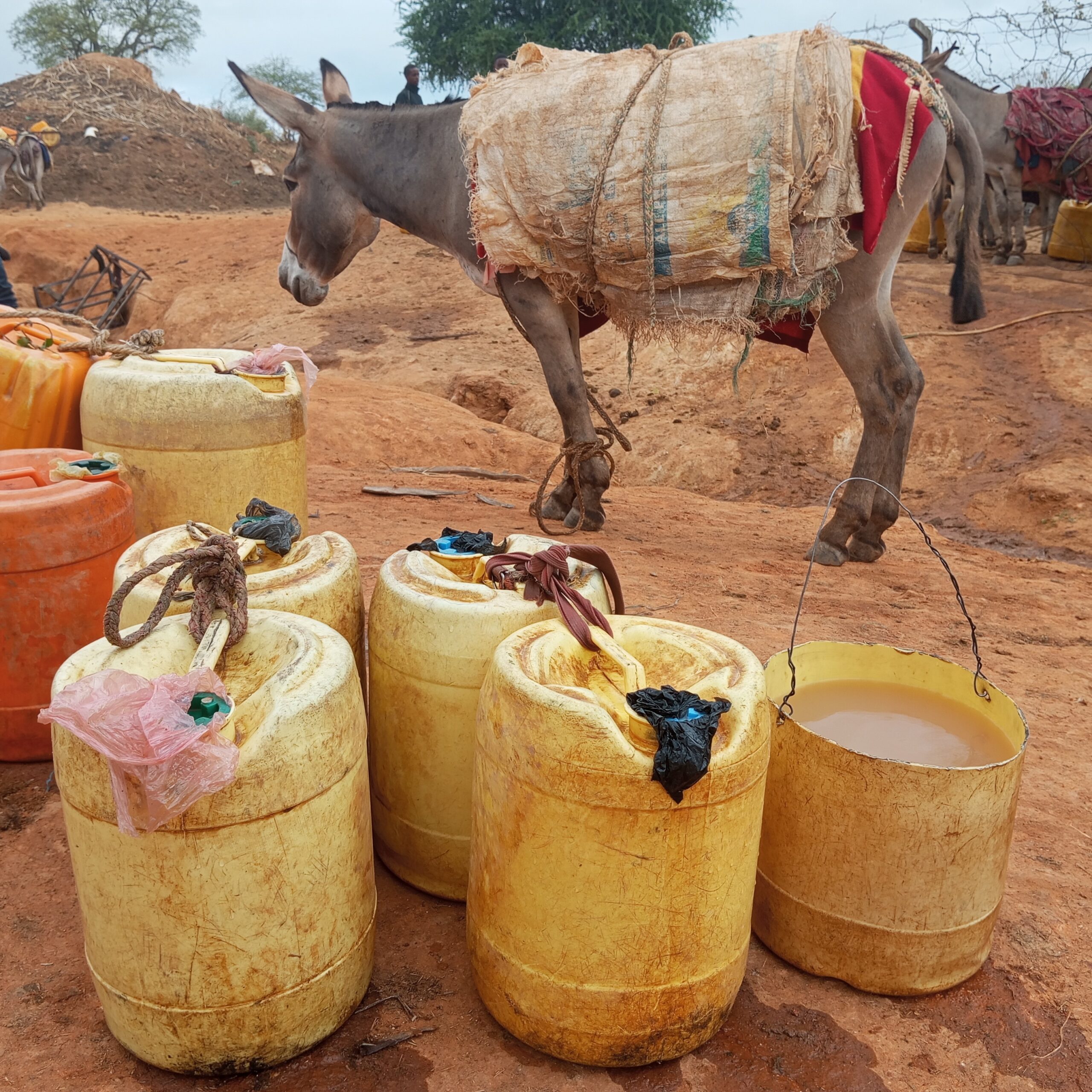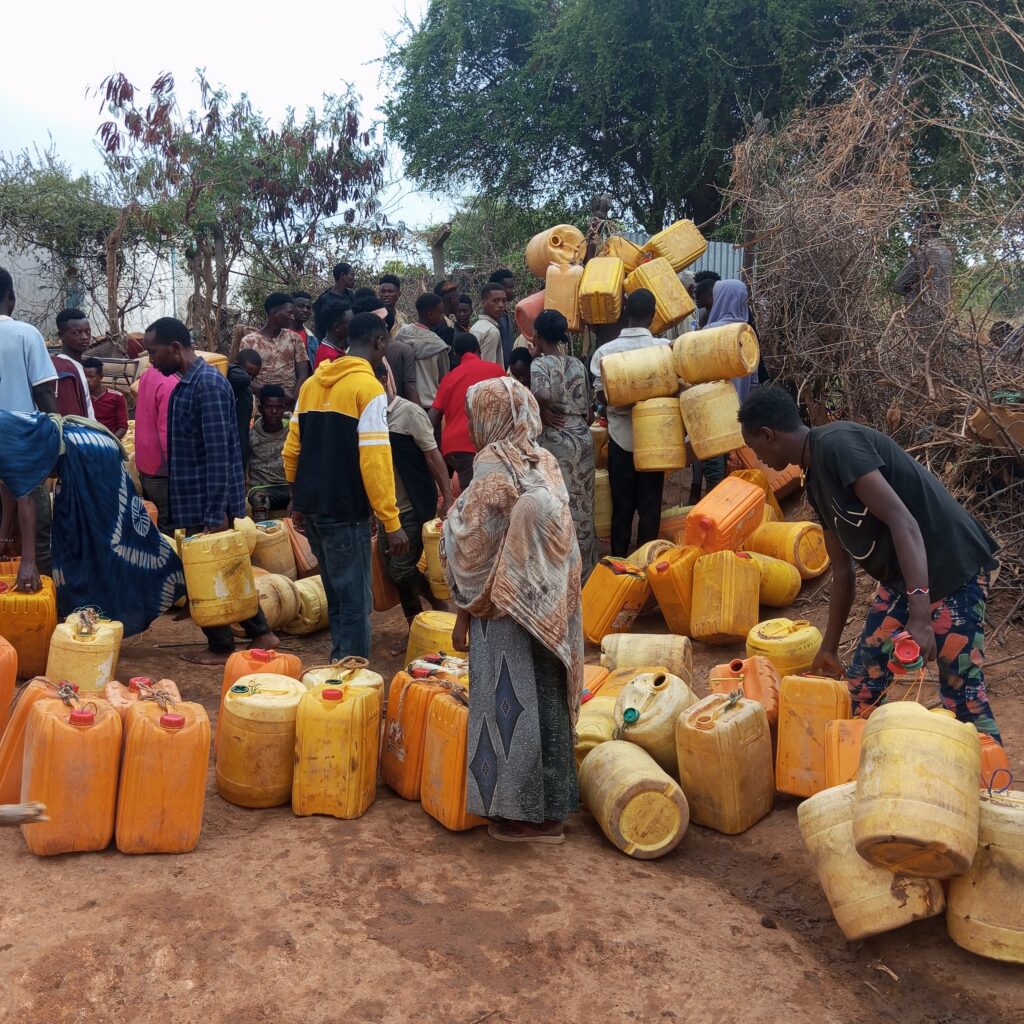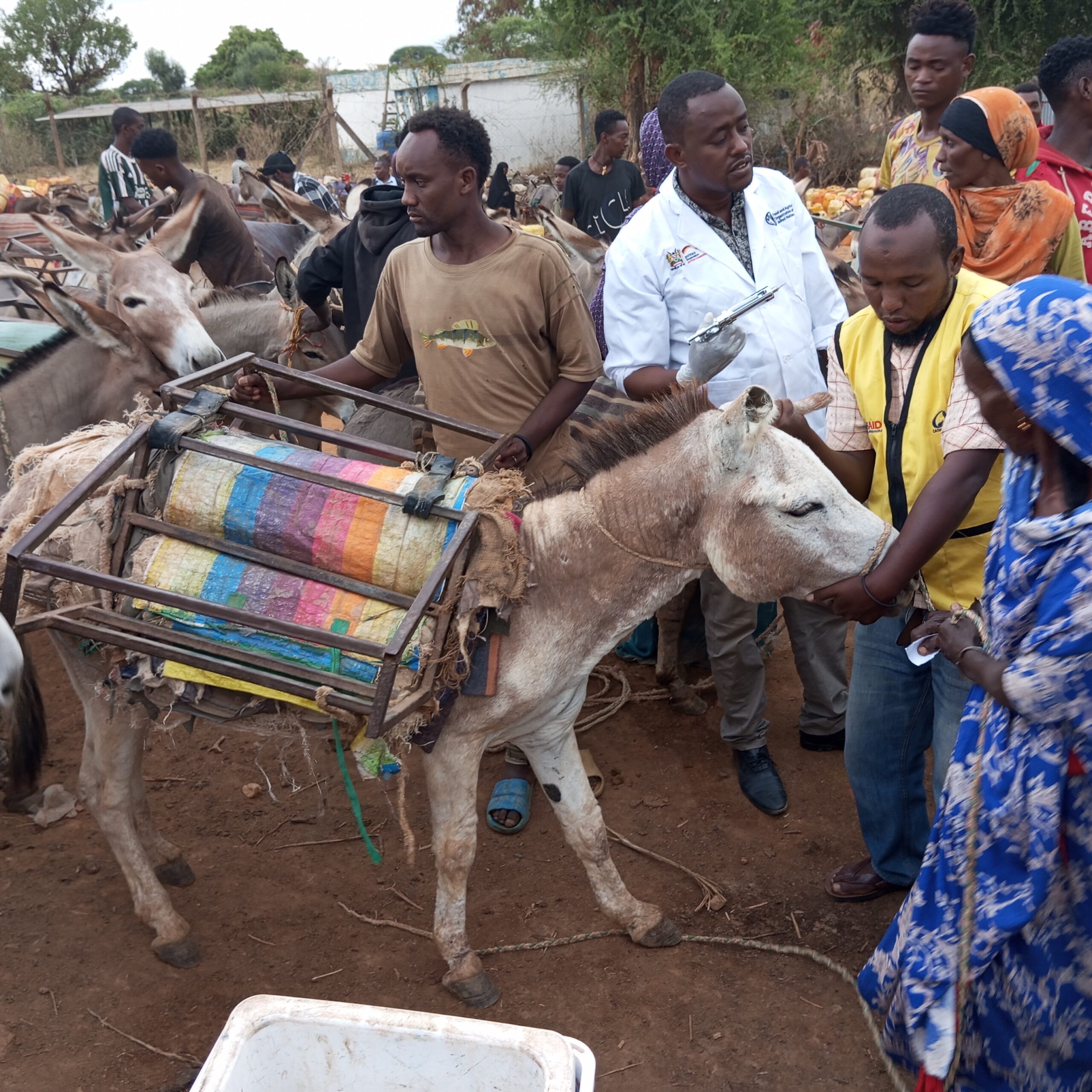Marsabit, Kenya– A pre-dawn chill hung in the air as we arrived in arrived in Heilu Manyatta ward, 772 kilometers away from Nairobi. It was early morning around 6 am and we were just in time to witness a donkey vaccination exercise.
Heilu Ward, located in Moyale sub-county, Marsabit County in northern Kenya, greeted us with a cacophony of braying donkeys and the clanging of jerrycans. Curiosity drew us towards the noise, leading us to a nearby water point where the animals were gathered.
At the dam’s entry, security guards told us that everybody was required to pay five Kenyan shillings for a 20-liter jerry can for locals and 10 Kenyan shillings for Ethiopians, the buyers later sold the water in Moyale town at 100 Kenya shillings per 20 litre jerrycan.
Out of curiosity, I peeped inside the dam to see how locals were fetching the water, and to my shock, the water was visibly unfit for human consumption.
Fatuma Dalle, a 42-year-old mother of six, villager, confirmed our fears. “The water is dirty, but we have no choice,” admitted Dalle while explaining how the lack of donkeys only worsened their plight.
Dalle spoke through a translator, a middle-aged man, who, decoded her Borana dialect.
Dalle admitted that, “The lack of proper water storage forced the residents to rely on rainwater which unfortunately was shared with wildlife and was often made dirty hence unfit for human consumption.”
“Before the dam was built, we used to trek for over five kilometers to look for water but since the dam was established through efforts of community members around Heilu ward, we have been relieved from the burden of walking for long distances. We water vendors have taken the initiative of employing two security guards to watch over the water from being contaminated by wild animals,” explained Dalle.
The water business was booming in the area as the vendors bought a 20-litre jerry can for five shillings and sold it for 100 shillings in the town.
Strategically located at the Kenya-Ethiopia border, Heilu Water Point served as a meeting point for communities from both sides. Ethiopians and residents from other wards paid a premium for the life-sustaining liquid.
Accordingly, Dalle admitted that the water business enabled her to fend for her family and even pay school fees for her six children. She remained optimistic and hopes that with time she will manage to buy more donkeys and expand her business.
Heilu Manyatta ward is a central point for donkey vaccination

A team from Africa Network for Animal Welfare (ANAW) in partnership with the County government of Marsabit in Moyale Sub-county partnered to vaccinate donkeys in Heilu and Banisa wards, targeting the dam site because of its central point for the beasts of burden.
As we strolled by the water point, a man named Abdi Dida caught our eye. He was arranging a row of bright yellow jerrycans to collect water. Despite his busy schedule, he stopped to share his approach to caring for his loyal donkeys.
“I rely on Ethiopians to look after them,” Dida explained. “They come from the neighboring country, and work from dawn to dusk.”
He went on to detail their employment terms, noting, “They receive a monthly salary ranging from Ksh. 2,000 to Ksh. 3,000, depending on the size of my donkey herd.”
The 48 year old said that most of them sought Ethiopians to enable them to engage in other activities and their children to go to schools without being troubled by having to graze their cattle.
“We share one market with the Ethiopians so in case anyone wants to buy a donkey it is never a problem. There are Kenyan men there who help with negotiation and even act as witnesses during the purchasing process,” explained Dida .
Dida who had been in the business for more than 20 years mentioned that one of the major challenges that the community faced was the inability to identify their donkeys in a herd when they got lost.
Dida also highlighted the challenges of identifying lost animals, he said, “We simply observe the direction from where the animal is coming from to tell if it is from Manyatta or Ethiopia. Ethiopian donkeys have dark body marks while the Kenyan ones have tattoo on the ears or use physical marks which at times resemble.”
Dida also revealed that the donkey owners only embark on a two-month search mission before giving up completely.
Inter- county transfer of donkeys a threat to the animals

“
“This village bore witness to the crackdown of slaughterhouses,” recounted Doctor Dennis Bahati, a Programs Manager from ANAW. “Illegal cross-border movements left numerous donkeys vulnerable to theft.”
We approached the water point with cautious steps with tension unfolding from a distance, mindful of the animals’ skittish nature.
Two middle-aged men gently restrained a donkey by its ears, signaling for the removal of the metal grille from its back to facilitate the procedure. Nearby, a veterinarian poised with needle in hand awaited the opportune moment, ready to administer the vaccine.
The metal grilles, once laden with water from the dam, served as makeshift supports for jerry cans.
Once the donkey grew calm, the vet swiftly injected the vaccine into its neck, withdrawing before the animal could detect any threat.
Dr. Bahati reflected on ANAW’s efforts since their arrival in 2021 to collaborate with Moyale sub-county and border patrol to bolster the security of these endangered creatures. “We’ve uncovered numerous welfare issues demanding attention,” he acknowledged.
“In recent weeks,” he continued, “we’ve witnessed a surge in illegal donkey movements across the Kenya-Ethiopia border. These unsuspecting animals venture into areas known as hotspots for donkey bush slaughter, posing a significant threat.”
Hassan Guyo, an official from the Marsabit County Department of Livestock and Veterinary Service overseeing the vaccination, confirmed that at least 400 donkeys had received treatment that day.
Guyo conceded to the prevalence of illegal cross-border donkey movement in the area over the past three months.
“It was reported that eight to ten lorries, transporting between 4000 to 6000 donkeys, crossed from the Moyale border to unknown destinations, leading to an increase in bush slaughter cases in areas like Naivasha,” Guyo disclosed.
However, there was a glimmer of hope in February 2024, when African heads of state and government collectively agreed to ban donkey slaughter for their skin, a measure aimed at protecting the continent’s 33 million donkeys.
Despite this progress, Guyo emphasized lingering legal loopholes that needed addressing to ensure the animals’ security.
“Donkey slaughter may be banned, but there remains a loophole allowing for their movement,” Guyo explained. “Traders exploit this gap, transporting animals to destinations for bush slaughter.”
He called upon the government and advocacy groups to take decisive action to ban the movement and slaughter of donkeys entirely.
Guyo expressed optimism in the potential of a donkey identification and traceability system to aid in the recovery of stolen animals in the event of large-scale theft.


Very interesting perspective, i only hope that climate change will not hamper businesses in Kenya